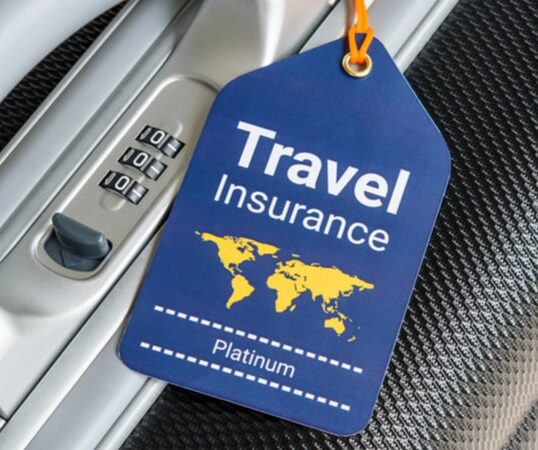
Travel Insurance is a type of insurance coverage designed to protect individuals against unexpected expenses and risks that can arise while traveling. It provides financial assistance and support in case of various travel-related incidents, ensuring that travelers have a safety net during their journeys.
Travel insurance typically covers a range of scenarios, including trip cancellations, delays, lost or delayed baggage, medical emergencies, evacuation, and more. Depending on the policy, it can also include coverage for emergency medical expenses, repatriation, and accidental injuries or illnesses that occur during the trip.
There are different types of travel insurance plans available, such as single-trip insurance for a specific journey, multi-trip insurance for frequent travelers, and specialized plans for adventure travel or international travel. Some policies also offer additional options like coverage for rental car damage or flight accident benefits.
Travel insurance provides peace of mind by offering financial protection and assistance when the unexpected happens during travel. It can help travelers recover costs associated with trip disruptions, medical emergencies, or other unforeseen events, reducing the financial impact of such incidents.
Before purchasing travel insurance, it’s important to carefully review the policy terms, coverage limits, exclusions, and any additional options. Travelers should consider their travel plans, destination, activities, and personal needs when selecting a travel insurance plan that aligns with their requirements and provides adequate coverage.
Cyber insurance, also known as cyber liability insurance or cyber risk insurance, is a specialized type of insurance coverage designed to protect individuals and businesses from the financial losses and liabilities associated with cyber-related incidents and data breaches. As technology and digital operations become integral to modern business, the need for cyber insurance has grown significantly.
Cyber insurance policies typically cover a range of risks, including data breaches, cyberattacks, ransomware, identity theft, and other cyber incidents that can compromise sensitive information and disrupt operations. The coverage may include expenses for notifying affected individuals, legal fees, public relations efforts, and costs associated with restoring data and systems.
Businesses of all sizes can benefit from cyber insurance, as cyber threats are prevalent and can lead to substantial financial losses and reputational damage. For smaller businesses, a single cyber incident can be financially devastating.
Cyber insurance policies can also be customized based on an organization’s specific industry, risk profile, and cybersecurity measures. Premiums are often determined by factors such as the size of the business, the nature of data handled, security practices, and previous cyber incident history.
In an era where cyber threats are evolving and increasing, cyber insurance provides a safety net for mitigating the financial impact of cyber incidents. It helps organizations recover more quickly and effectively in the aftermath of a cyberattack or data breach, supporting their reputation and overall resilience in the digital age.


Money-back insurance, also known as money-back policy or anticipated endowment policy, is a type of life insurance that combines elements of both life insurance coverage and periodic payouts to the policyholder during the policy’s duration. This type of insurance offers periodic returns of a portion of the sum assured at specified intervals, while also providing a death benefit to the beneficiary in case the insured passes away during the policy term.
Under a money-back insurance policy, the insured receives a percentage of the sum assured at regular intervals, which are predetermined at the time of policy issuance. These intervals are typically every few years, such as 5, 10, or 15 years. These periodic payouts are often referred to as “survival benefits” and can be utilized by the policyholder for various financial needs or goals.
If the insured survives the entire policy term, they receive the remaining sum assured as a maturity benefit at the end of the policy term. If the insured passes away during the policy term, the beneficiary receives the death benefit, which includes the original sum assured, regardless of the survival benefits already paid.
Money-back insurance is popular among individuals who want a combination of life insurance coverage, periodic payouts to meet financial needs, and the assurance of receiving a lump-sum amount at maturity. It provides the benefits of financial protection, liquidity, and the potential to meet short-term financial goals.
Before purchasing a money-back insurance policy, individuals should carefully consider factors such as the policy’s term, premium payments, periodic payouts, and overall financial objectives. This type of insurance offers a balanced approach by providing both life insurance coverage and periodic returns, catering to policyholders’ insurance and financial needs.
Household/Home insurance, also known as homeowners insurance or property insurance, is a type of insurance coverage that provides financial protection for individuals’ homes and their contents against various risks and perils. It’s designed to help homeowners or renters recover from losses or damages that may occur due to unexpected events.
Household insurance typically includes two main components:
Property Coverage: This aspect of household insurance covers the physical structure of the home and other structures on the property, such as garages or sheds. It protects against perils like fire, lightning, windstorms, vandalism, and theft. In case of covered damage, the insurance helps cover repair or replacement costs.
Contents Coverage: This component protects the personal belongings and possessions inside the home, including furniture, electronics, clothing, and other valuables. In case of damage or theft, the insurance provides compensation to replace or repair these items.
Household insurance policies can also offer liability coverage, which protects homeowners from legal and financial liabilities if someone gets injured on their property.
The cost of household insurance varies based on factors like the property’s location, value, construction type, and the level of coverage desired. Different insurance providers offer various packages and add-ons to tailor the policy to individual needs.
Household insurance is essential for protecting one’s investment in a home and personal belongings. It provides peace of mind, ensuring that homeowners and renters have a financial safety net in case of unforeseen events that could otherwise lead to significant financial strain.


Commercial insurance, also known as business insurance, is a type of insurance coverage designed to protect businesses from a wide range of risks and liabilities. It provides financial security and support in case of unexpected events that could otherwise lead to substantial financial losses and disruptions to business operations.
Commercial insurance policies can be customized to meet the specific needs of different industries, sectors, and business sizes. Some common types of commercial insurance coverage include:
Property Insurance: Covers physical assets such as buildings, equipment, inventory, and furniture against perils like fire, vandalism, and natural disasters.
General Liability Insurance: Protects against third-party claims for bodily injury, property damage, and related legal expenses that occur on business premises or due to business operations.
Commercial Auto Insurance: Provides coverage for vehicles used for business purposes, including liability, physical damage, and medical expenses.
Workers’ Compensation Insurance: Compensates employees for medical expenses and lost wages in case of work-related injuries or illnesses.
Professional Liability (Errors and Omissions) Insurance: Covers professionals against claims of negligence, errors, or omissions in their services or advice.
Cyber Liability Insurance: Protects against data breaches, cyberattacks, and related legal liabilities.
Business Interruption Insurance: Covers income loss and ongoing expenses when business operations are disrupted due to covered events.
Commercial insurance is a vital component for businesses to manage risk and safeguard their financial well-being. It helps businesses continue operations even in challenging circumstances, protects against unexpected events, and provides a safety net against potential lawsuits and liabilities. The specific coverage needs depend on the nature of the business, industry regulations, and risk assessment.
Vehicle insurance, commonly known as auto insurance or car insurance, is a type of insurance coverage designed to protect vehicle owners against financial losses resulting from accidents, theft, and other unforeseen events involving their vehicles. It is mandatory in many countries to have vehicle insurance before driving on public roads.
Vehicle insurance policies typically offer several types of coverage:
Liability Coverage: This covers the costs if you are legally liable for causing bodily injury or property damage to another party in an accident.
Collision Coverage: This covers the repair or replacement costs of your vehicle if it’s damaged in a collision with another vehicle or object.
Comprehensive Coverage: This covers damage to your vehicle that’s not caused by a collision, such as theft, vandalism, natural disasters, and more.
Uninsured/Underinsured Motorist Coverage: This protects you if you’re involved in an accident with a driver who has insufficient or no insurance.
Medical Payments Coverage: This covers medical expenses for you and your passengers if injured in an accident, regardless of who’s at fault.
Vehicle insurance premiums are determined based on factors like the type of coverage, the make and model of the vehicle, the driver’s age and driving record, and the location where the vehicle is primarily used.
Vehicle insurance provides financial protection and legal compliance, offering peace of mind to vehicle owners and drivers. It ensures that they have a safety net to cover the costs associated with accidents, damages, and potential liabilities while operating their vehicles on public roads.


Stock insurance in India provides coverage for businesses against financial losses resulting from damage, theft, or loss of their inventory or stock. It is vital for businesses dealing with physical goods, such as retailers and manufacturers. This insurance safeguards against risks like fire, burglary, natural disasters, and transit damage. Stock insurance ensures that businesses can quickly recover and continue operations in case of inventory-related losses. It encourages risk management practices, ensures business continuity, and maintains customer confidence. Accurate valuation of inventory, understanding coverage limits, and policy terms are crucial when considering stock insurance. Premiums are influenced by factors like inventory type, value, and location. Overall, stock insurance offers financial security, enabling businesses to navigate unexpected events without significant disruptions.
